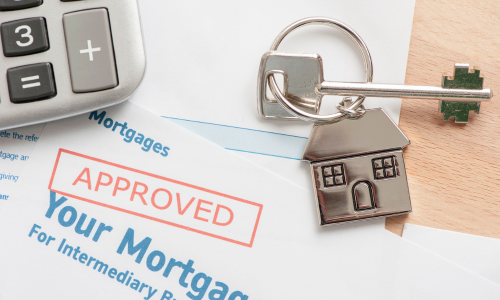Get Preapproved and Search for Your Dream Home
Apply NowMortgage Preapproval

In the journey of homeownership, mortgage preapproval is a vital step that can make or break your dreams of owning a home. As a seasoned mortgage broker, I’m here to guide you through the importance of mortgage preapproval and how it can significantly benefit you as a homebuyer.
An essential first step in the home-buying process is getting a mortgage preapproval, during which a lender assesses your financial standing and creditworthiness to establish the maximum loan amount you are eligible for. Preapproval entails a thorough study of your financial papers, including income, credit history, assets, and obligations, in contrast to prequalification, which is a minimal evaluation. You are given a certain loan amount and interest rate, enabling you to look for properties within your price range.
Benefits of mortgage preapproval

- Accurate budgeting: Accurate budgeting is made possible by mortgage preapproval, which enables you to focus your home search on houses that fall within your price range.
- Competitive Advantage: Preapproved buyers appear out as serious and committed in a competitive housing market. Preapproved buyer’s offers are frequently more favorably viewed by sellers, perhaps giving you the upper hand in negotiations.
- Quicker Closing: With preapproval in hand, the mortgage process can move more swiftly, helping you close the deal faster once you find the right home.
- Realistic Expectations: Setting realistic expectations regarding the kinds and areas of homes you can afford with preapproval helps you avoid disappointment later in the process.
Steps involved in the mortgage preapproval processes:
- Gather documentation: In order to start the preapproval procedure, you must present financial records, including pay stubs, tax returns, bank statements, and information about your outstanding obligations.
- Pick a lender: In my capacity as a mortgage broker, I can assist you in choosing a reputable lender that best meets your requirements and financial circumstances. The loan programs and interest rates that different lenders offer may vary.
- Finish the application: You must complete a mortgage application, providing important details about your employment history, credit history, and the sort of loan you’re looking for.
- Credit check: To determine your creditworthiness, the lender will run a credit check. In order to get advantageous conditions, you need to have a strong credit score.
- Evaluation and preapproval: To determine the maximum loan amount and interest rate you are eligible for, the lender will examine your financial records and credit report. They might also provide you a note of preapproval.
- Use preapproval wisely: After receiving preapproval, it’s important to avoid making major financial changes, such as changing jobs or making expensive purchases, as these actions may influence your loan eligibility.
Leveraging mortgage preapproval in homebuying
With your preapproval letter in hand, you are now equipped to start your home search with confidence. Here’s how you can leverage your preapproval:
- Targeted house hunting: Spend less time and effort looking at homes that fit inside your preapproved spending limit.
- Negotiating power: Your preapproval letter demonstrates to sellers that you are a serious buyer when you submit an offer on a home. This might result in more fruitful talks.
- Easy closing: Your preapproval speeds up the mortgage application process, which makes it simpler to seal the deal once you’ve found your ideal house.
Things to be considered for the preapproval process
Preapproval for a mortgage entails a careful review of your past and present financial circumstances. Lenders will ask for a number of documentation, such as:
- Income Verification: To prove your steady income, you must present pay stubs, W-2 papers, or tax records. Lenders can use this information to assess your ability to make mortgage payments.
- Credit Report: To evaluate your credit score and credit history, lenders will get your credit report from one or more of the main credit bureaus (Equifax Canada, TransUnion Canada). Better loan rates are often available with a high credit score.
- Asset Documentation: Your ability to make the down payment and closing charges is demonstrated by your bank account and investment account records. Lenders want to make sure you have enough cash on hand.
- Debt information: Your current debts, including credit card balances, school loans, and auto loans, must be disclosed. When assessing your preapproval, lenders take into account your debt-to-income ratio.
The preapproval process heavily relies on your credit score. This three-digit number is used by lenders to evaluate your creditworthiness. In general, cheaper interest rates and better loan terms are associated with a higher credit score. A credit score of 700 or more is frequently regarded as desirable for conventional loans, while particular score requirements differ between lenders and lending programs. You might still be eligible for loans with a lower score, but the terms might not be as favorable.
Upon reviewing your financial information, the lender will issue a preapproval letter. This document contains critical details, such as the maximum loan amount for which you qualify, the applicable interest rate, and the loan’s duration. As you embark on your home search, this letter becomes a valuable asset, demonstrating to sellers and real estate agents your serious intent and financial capacity.
During the preapproval process, some lenders provide you the choice to lock in the interest rate. If interest rates are anticipated to increase soon, this may be helpful. You must close on a house before the expiration date of a rate lock in order to maintain the agreed-upon rate.
It’s crucial to remember that preapproval is frequently constrained. This means that even though you have been preapproved for a loan, the final approval is subject to the fulfillment of a few requirements. Common requirements include a positive property evaluation, proof of your income and work, and no material changes to your financial circumstances.
A preapproval for a mortgage does not tie you to a particular lender. To compare rates and terms, you can get preapprovals from various lenders. This comparison shopping can assist you in locating the best mortgage offer. Be aware that each lender’s credit check may have a short-term negative impact on your credit score, although to lessen the impact, several mortgage-related credit inquiries made in a short period of time are frequently regarded as a single request.
A thorough financial assessment known as a mortgage preapproval paints a clear picture of your ability to purchase a home. It’s an essential phase in the home-buying process that gives you the power to decide wisely, negotiate skillfully, and eventually obtain the house of your dreams on advantageous terms. As your trusted mortgage broker, I can further streamline this process and help you navigate the complexities of securing a mortgage.
